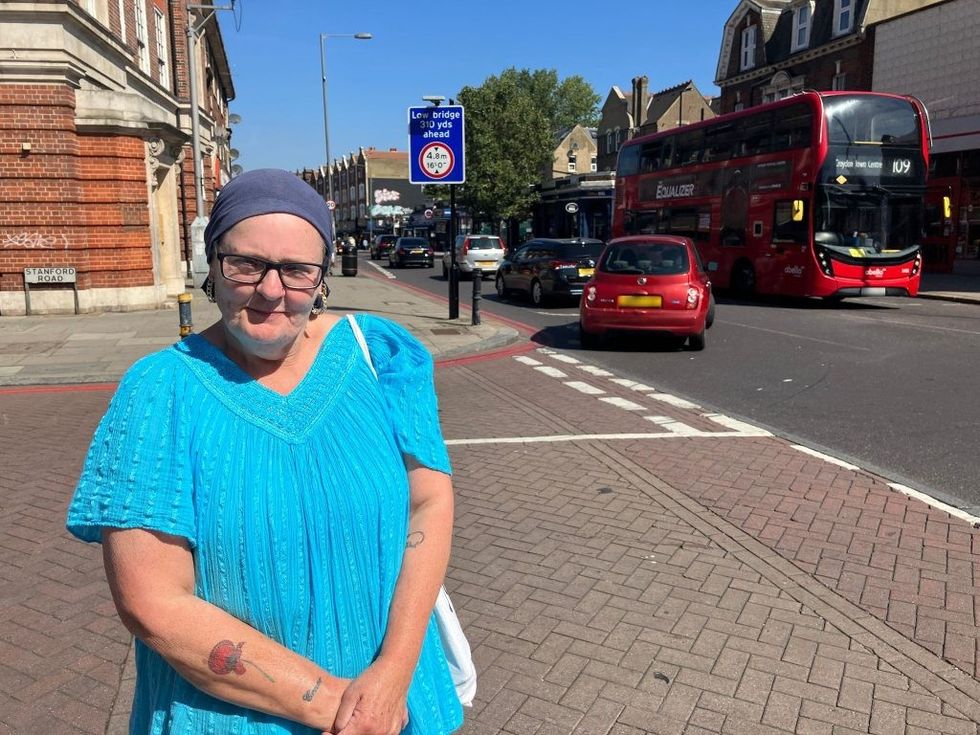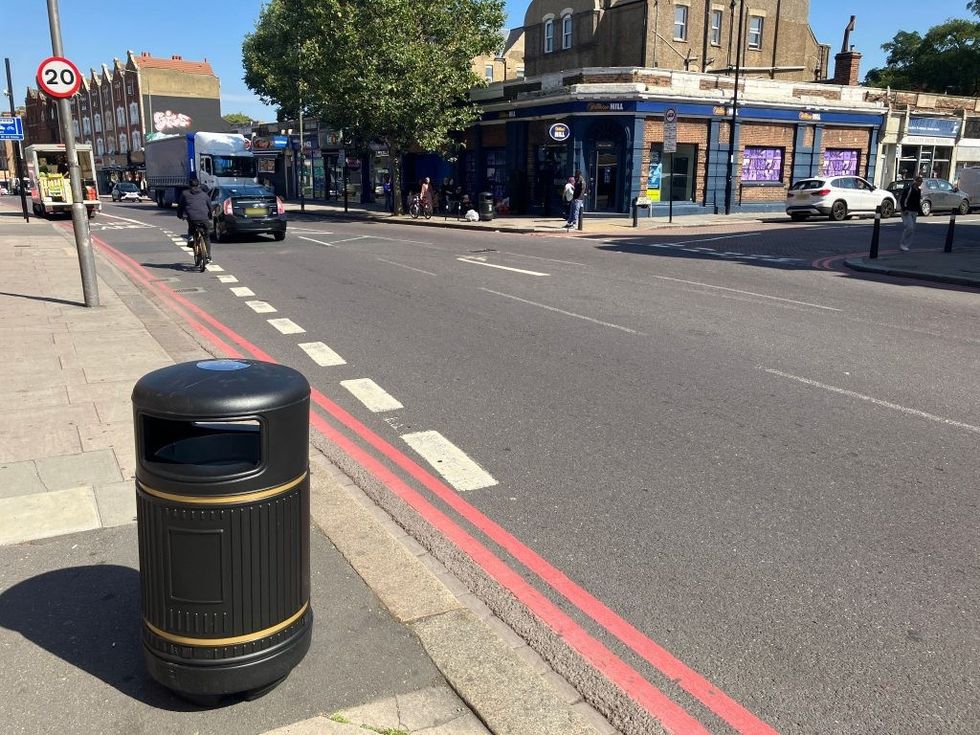By Joe Coughlan, Local Democracy Reporter
A South London high street has been described as going “downhill” by locals, with some saying they “don’t feel safe anywhere” after a series of reported knife fights in the area. London Road in Norbury, also known as Norbury High Street, sits in the north of Croydon borough, with trains connecting the town centre to central stations such as London Bridge and Victoria.
Croydon Council announced on Monday that Norbury High Street would be the first of the borough’s town centres to benefit from a series of “blitz” clean ups from the authority, in order to restore a sense of “pride”. Works to the street include tackling fly-tipping hotspots, removing graffiti, gully cleansing and jet washing pavements if necessary.
The council said in a statement that Norbury High Street had been identified as a priority area based on data from the Love Clean Streets App.

Tina McIntyre, 61, was born and raised in Norbury. She said that she still uses the high street “all the time”, despite the area becoming dirtier in recent years.
Ms McIntyre told the Local Democracy Reporting Service (LDRS): “The last couple of years, it’s gone really down. It seems to have picked up a little in the last couple of months I reckon… All of a sudden all of the bins went and it was a nightmare. And they’re saying don’t throw rubbish, well where are you supposed to put it?”
The resident said that she rarely goes down the street at night anymore. She said problems such as overgrown trees covering street lights make residents feel less safe in the evenings. Ms McIntyre said: “It is dodgy around here. It was never like this before. It’s gone downhill in that sense… Someone would always say, ‘Oh, there was another fight down in Norbury,’ and shop windows get smashed. I don’t feel safe anywhere really anymore.”
Desmond Booth, 51, has been living in Norbury for over 30 years and said fly-tipping can be an issue due to the lack of bins in the area. He said he also chooses not to come out on the street at night due to antisocial behaviour outside the shops.
Mr Booth told the LDRS: “There’s too many kids hanging around certain areas, too much drinking. I don’t find it intimidating, but it depends. That mostly happens in the evening, not in the daytime… There aren’t many street lights around.”
Croydon Council carried out a trial last year of halving light levels from street lights on main roads between midnight and 5am. Council documents from February this year found that the initiative could save the council £967,000 a year.
Jason Perry, Executive Mayor of Croydon, told the LDRS: “The tree cutting programme is something that we are looking into at the moment. The street lights are relatively new in Croydon so as people have pointed out, sometimes they are obscured by branches, so that is something that we will look out for.”

Hopy Zonzholot, 43, has owned a grocery on Norbury High Street for the past 11 years. He claims that while he rarely notices problems with rubbish in the area, fights between teenagers have occurred regularly outside his shop.
Mr Zonzholot told the LDRS: “Just opposite, sometimes the kids fight. When they fight, if you call the police they don’t come [straight away], they come after. They’re very violent, with knives and all that kind of stuff. Recently it’s been kind of quiet but it was all the time. I feel safe, right now it’s all right but before then it was every two weeks.”
Met Police crime data shows that there were 15 reported knife crime offences between January and June of this year in the Norbury and Pollards Hill ward, averaging at three offences a month. The data also states that 148 cases of violence against the person were reported in this time. These offences are defined as including harassment, assault and bodily harm.
The shop owner said he rarely sees police coming to the area when they are called. He also said he feels violence in the area is a much greater problem than litter and graffiti, and would rather see the council do something to target crime. He said: “They only come when they want to do the things they want to do. If we want them to do something for us, they do not.”
The Mayor of Croydon told the LDRS that the council was working very closely with the police to tackle antisocial behaviour in Norbury. He said the authority was coming up with specific ways to deal with the issue and recognised some areas may experience more problems than others.
He said: “I think that it comes back to taking ownership of a space. If an area looks downbeat and unloved, then antisocial behaviour will follow. I think when we start to take pride in an area and take ownership in the local shops, then the antisocial behaviour tends to decrease hand in hand.”

Raj Hamel, 38, is the manager of a corner shop on Norbury High Street. He said he has never experienced any issues with fights outside his shop, and wants Croydon Council to focus on adding more bins to the area instead of targeting fly-tipping.
Mr Hamel told the LDRS: “If they want to waste money let them do it. To be honest, there’s a lot of littering going on here. That needs to be fixed more than anything. In this whole area, there’s only one public bin.”
He added: “We leave at night and it will be normal. When we come back down in the morning, there will be bottles everywhere. Like I said, there’s no bins around for people to throw items away.”
Tony Hooker, of community-based charity Litter Free Norbury, said in a statement that the group was delighted Norbury had been chosen as the first area for the council’s new clean up scheme. He said the charity welcomes anything that seeks to improve the area and is supportive of the council’s “blitz” initiative.
Mr Hooker told the LDRS: “Litter Free Norbury’s mission is to tackle issues with litter and fly-tipping in the area, engaging with residents and businesses to look to improve attitudes and challenge the council where service standards are not being maintained.”
He added: “In respect of street litter bin provisions on London Road, we have undertaken a two-year campaign to improve the bin infrastructure and are pleased to report that through engagement with the council service over 20 bins have been reinstated in the area. We believe this should negate any argument that there are no bins for people to dispose of litter responsibly.”
Andy Wiseall, Transport for London’s Head of Asset Operations, said: “It’s a top priority to ensure that our highways are safe and well maintained. We carry out regular inspections to ensure all of our infrastructure, including streetlights, are working as they should and we will make sure this is the case in Norbury. We encourage local residents to report any maintenance concerns to us and are happy to discuss proposals for investment in new lighting with the council and residents.”
A Met Police spokesperson told the LDRS: “Local officers include the London Road area on their regular patrols in Norbury and are committed to dealing with any reports of antisocial behaviour and associated criminality that are raised with them. Any call made to police will be assessed and responded to appropriately, and officers despatched in a timely manner.”
They added: “If you have any issues you wish to report, or concerns you wish to raise, then please report via the Metropolitan Police website at www.met.police.uk, or by dialling 101. In an emergency, always dial 999.”
(Local Democracy Reporting Service)






